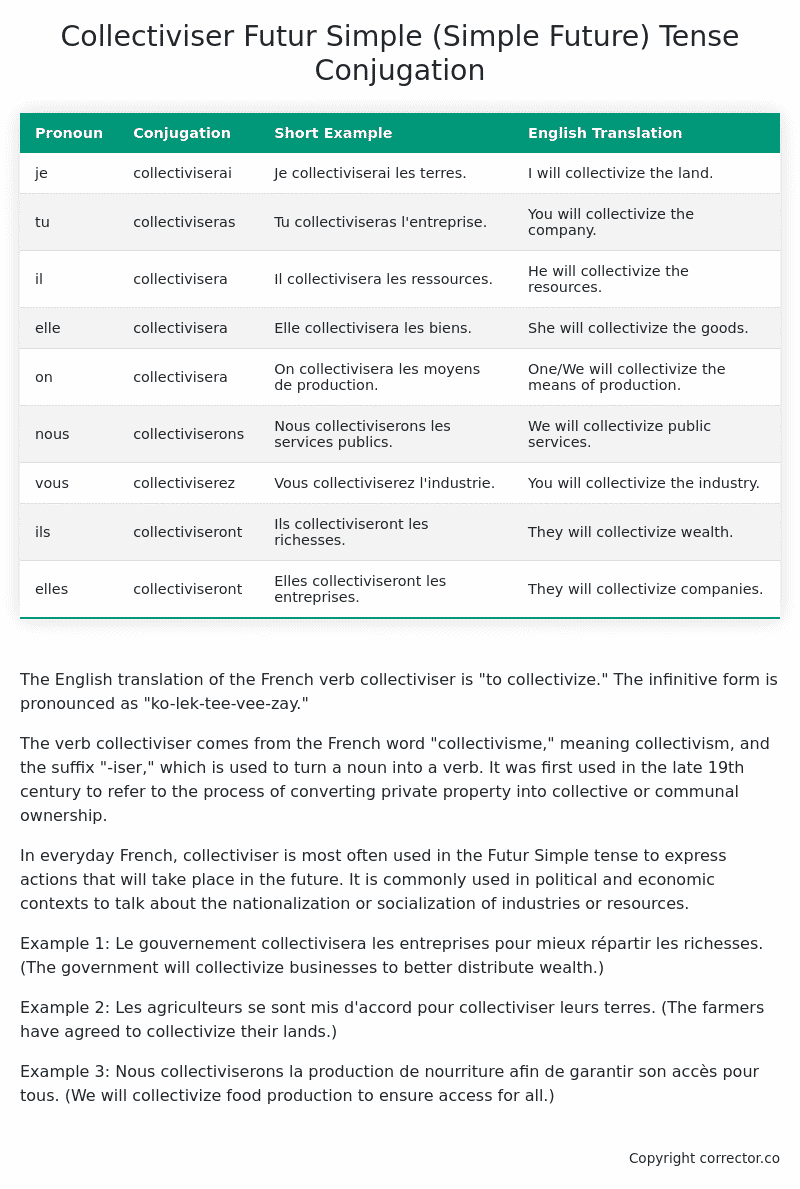Futur Simple (Simple Future) Tense Conjugation of the French Verb collectiviser
Introduction to the verb collectiviser
The English translation of the French verb collectiviser is “to collectivize.” The infinitive form is pronounced as “ko-lek-tee-vee-zay.”
The verb collectiviser comes from the French word “collectivisme,” meaning collectivism, and the suffix “-iser,” which is used to turn a noun into a verb. It was first used in the late 19th century to refer to the process of converting private property into collective or communal ownership.
In everyday French, collectiviser is most often used in the Futur Simple tense to express actions that will take place in the future. It is commonly used in political and economic contexts to talk about the nationalization or socialization of industries or resources.
Example 1: Le gouvernement collectivisera les entreprises pour mieux répartir les richesses. (The government will collectivize businesses to better distribute wealth.)
Example 2: Les agriculteurs se sont mis d’accord pour collectiviser leurs terres. (The farmers have agreed to collectivize their lands.)
Example 3: Nous collectiviserons la production de nourriture afin de garantir son accès pour tous. (We will collectivize food production to ensure access for all.)
Table of the Futur Simple (Simple Future) Tense Conjugation of collectiviser
| Pronoun | Conjugation | Short Example | English Translation |
|---|---|---|---|
| je | collectiviserai | Je collectiviserai les terres. | I will collectivize the land. |
| tu | collectiviseras | Tu collectiviseras l’entreprise. | You will collectivize the company. |
| il | collectivisera | Il collectivisera les ressources. | He will collectivize the resources. |
| elle | collectivisera | Elle collectivisera les biens. | She will collectivize the goods. |
| on | collectivisera | On collectivisera les moyens de production. | One/We will collectivize the means of production. |
| nous | collectiviserons | Nous collectiviserons les services publics. | We will collectivize public services. |
| vous | collectiviserez | Vous collectiviserez l’industrie. | You will collectivize the industry. |
| ils | collectiviseront | Ils collectiviseront les richesses. | They will collectivize wealth. |
| elles | collectiviseront | Elles collectiviseront les entreprises. | They will collectivize companies. |
Other Conjugations for Collectiviser.
Le Present (Present Tense) Conjugation of the French Verb collectiviser
Imparfait (Imperfect) Tense Conjugation of the French Verb collectiviser
Passé Simple (Simple Past) Tense Conjugation of the French Verb collectiviser
Passé Composé (Present Perfect) Tense Conjugation of the French Verb collectiviser
Futur Simple (Simple Future) Tense Conjugation of the French Verb collectiviser (this article)
Futur Proche (Near Future) Tense Conjugation of the French Verb collectiviser
Plus-que-parfait (Pluperfect) Tense Conjugation of the French Verb collectiviser
Passé Antérieur (Past Anterior) Tense Conjugation of the French Verb collectiviser
Futur Antérieur (Future Anterior) Tense Conjugation of the French Verb collectiviser
Subjonctif Présent (Subjunctive Present) Tense Conjugation of the French Verb collectiviser
Subjonctif Passé (Subjunctive Past) Tense Conjugation of the French Verb collectiviser
Subjonctif Imparfait (Subjunctive Imperfect) Tense Conjugation of the French Verb collectiviser
Conditionnel Présent (Conditional Present) Tense Conjugation of the French Verb collectiviser
Conditionnel Passé (Conditional Past) Tense Conjugation of the French Verb collectiviser
L’impératif Présent (Imperative Present) Tense Conjugation of the French Verb collectiviser
L’infinitif Présent (Infinitive Present) Tense Conjugation of the French Verb collectiviser
Struggling with French verbs or the language in general? Why not use our free French Grammar Checker – no registration required!
Get a FREE Download Study Sheet of this Conjugation 🔥
Simply right click the image below, click “save image” and get your free reference for the collectiviser Futur Simple tense conjugation!

Collectiviser – About the French Futur Simple (Simple Future) Tense
Formation of Futur Simple
For regular -er verbs (e.g., parler – to speak)
For regular -ir verbs (e.g., finir – to finish)
For regular -re verbs (e.g., vendre – to sell)
Common Everyday Usage Patterns
Conditional Statements
Interactions with Other Tenses
Futur Antérieur
Conditional
Present
Summary
I hope you enjoyed this article on the verb collectiviser. Still in a learning mood? Check out another TOTALLY random French verb conjugation!


